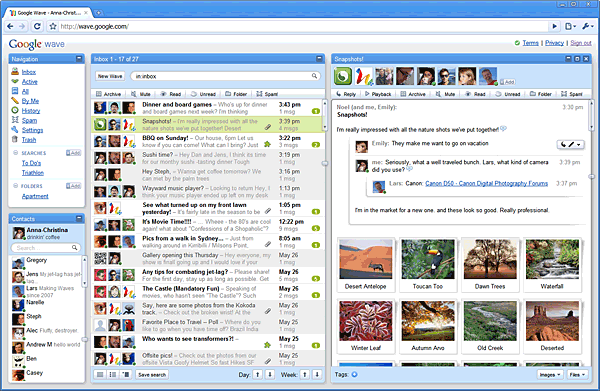Google said it would have a big announcement at its developer conference this week, and it didn’t disappoint. Google Wave will be the buzz of the Internet in the months between its demonstration last week and its rollout at an undisclosed time later this year. Wave has some important implications for the news industry, so it’s a good idea to become familiar with it. Here’s our early reaction.
Wikis are important metaphor for newsgathering. They enable multiple authors to flexibly contribute information and edit each other’s entries to build a kind of living news account. Wikipedia is, in many ways, a metaphor for the newspaper of the future.
Google has always liked wikis. Its search engine results page is being slowly rejiggered to add wiki functionality and recent initiatives like Knol are a Google spin on Wikipedia.
Wave takes the wiki model to a new level with the addition of Twitter-like immediacy along with classic e-mail and discussion techniques like the inbox and threading. Wave also has the ability to handle just about any kind of file you can throw at it. Adding documents, webpages and media to a Wave workspace is a drag-and-drop procedure, and once the content is there, everyone can edit it.

Open and Extendable
Google Wave has some cool bells and whistles, such as its real-time updates (you can actually see your friends typing, letter by letter), flexible conversation threading and embedded search. But what’s more important is some of the underlying plumbing.
For starters, the application is open source, meaning that third-party software developers will quickly improve and build upon it. Google learned its lessons from its Maps service: enabling people to easily extend the engine results in a much richer resource for everyone. Maps is now the undisputed leader in its space, having displaced some entrenched competitors in just four years.
Second is Wave’s flexibility. Wikis have always suffered from usability problems in this respect. It’s fairly easy to edit basic text information, but incorporating multimedia can be a chore. The Google demo shows people dragging and dropping photos and video files into a Wave workspace with ease, making them immediately available to everyone participating in a Wave.
Finally, Wave is shareable out of the box. Any Wave can easily be turned into an “embed” and placed on another website. Visitors can join a conversation from within the embed. This is kind of like blog comments on steroids. A real-time interaction can be going on between multiple users of a Wave with the results appearing on many other websites.
Work in Progress
Wave is still demoware, and its first public iteration will no doubt lack many features. But this looks to be an important new development in the way groups process and build information repositories. For news organizations, it could be an opportunity to really involve readers in an ongoing conversation that aggregates multiple perspectives and a workspace that is still managed by professional editors. The real-time chat functionality could be a potent competitor to Twitter.
News organizations have a new problem to solve: information overload. This is a complete reversal of their traditional service as information gatherers. Today, the bigger problem is to parse and organize the deluge of information that comes at us. Google Wave will no doubt add to that deluge, but it also has the capacity to help us organize and make sense of it.
Jeff Jarvis speculates on some possibilities. Mashable has a comprehensive overview of the product and a first hands-on trial. Google Blogoscoped has the entire one-hour-plus demo from the Google Developer Conference.
Comments
This entry was posted on Monday, June 1st, 2009 at 9:05 am and is filed under Hyper-local. You can follow any responses to this entry through the RSS 2.0 feed. Both comments and pings are currently closed.



Gee..looks like Facebook and Twitter may face the wrath of the mighty Google with this one..I await the iPhone app!
[…] Jarvis’ point about the collaborative nature of future news is echoed by Paul Gillin, writing for Newspaper Death Watch: […]
[…] Google Wave May Reshape Newsgathering | Newspaper Death Watch […]